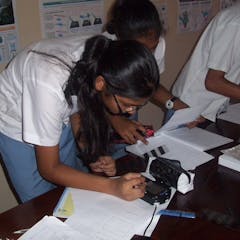
Articles on Cognitive development
Displaying 1 - 20 of 50 articles

Two experts on children’s play explain why you should be skeptical of toys that are advertised as being educational, and what to look for instead.

How should we understand what toys or ‘loose part’ materials support children’s play, and what’s the relationship of parents’ education and income to this? A study aims to find out.

Children get a hard time for being dishonest but it’s a sign of healthy brain development.

Though child marriage rates are declining globally, the practice remains worryingly common in some African countries.

Parents are often the primary source of information that children receive from their environment. How consistent parents’ interactions with their children are matters.

Children may hear a lot of words when sitting in front of or interacting with screens, but to learn language children need to interact with physical objects.

A study showed that, on average, more greenery around primary schools was associated with better NAPLAN scores. Higher exposure to traffic-related pollution was associated with poorer scores.

Children exposed to intimate partner violence were two to three times more likely to have impaired language skills, sleep problems, elevated blood pressure and asthma.

Research shows multiple social and cognitive benefits of playing video games.

Supporting play begins with parents attending to their own wellness and seeing children as drivers of their own play.

Contrary to the belief that resource strained parents invest in academically stronger children, studies show that Ethiopian parents tend to invest more in the child with lower academic capabilities.

As children’s self-regulatory capacities and the prefrontal regions of their brains develop, so does their ability to carry out their future intentions.

Researchers who looked at over 110,000 students found that learning an instrument in elementary school, and continuing music study into high school, significantly improves school achievement.

Reading styles vary in effectiveness. Here are six things you can do, based on research, to help your child get the most out of shared reading.

School is out and screens make tempting babysitters. Follow these recommendations to allow your child some screen time without compromising their health and development.

Everybody wants more self-control, but it’s proven difficult to beef up through training. New research suggests that what your social group does might be key to enhancing your own self-control skills.

New evidence that old beliefs about people with conditions that prevent them from speaking or moving are not always right.

African board games are learning spaces for players to develop cognitive and non-cognitive skills given the mechanics or rules embedded in these games.

Policy choices made by Senegal, Ghana, Rwanda, Angola, Cameroon, Ethiopia and Togo over the past 15 years have led to significant reductions in child undernourishment.

The affective domain - motivation, interest and values and their inter-relationships - forms an integral component in facilitating learners’ construction of physics knowledge.
